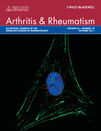Cigarette smoking is not a risk factor for systemic sclerosis
Abstract
Objective
To investigate the association of cigarette smoking with susceptibility to systemic sclerosis (SSc) in a large, well-defined patient population.
Methods
We conducted a review of 1,379 patients with SSc enrolled in the Scleroderma Family Registry and DNA Repository and/or the Genetics versus Environment in Scleroderma Outcome Study cohort. Smoking history was obtained from chart review or via telephone interview. Patients with SSc were subsequently categorized as never smokers or ever smokers. Patients with SSc for whom smoking data were available were matched 2:1 by age, sex, ethnicity, and state of residence to control subjects, using the Behavioral Risk Factor Surveillance System.
Results
The majority of patients were white (74.2%), with Hispanics and blacks representing 11.3% and 9.7%, respectively. Most patients had limited cutaneous involvement (54%). For our comparative analyses, 621 patients were matched with control subjects. There was no significant difference in age, sex, ethnicity, and SSc subtype between matched versus unmatched patients. The majority of patients had never smoked (57%), while 43% of patients were classified as ever smokers. The patients with SSc did not differ from control subjects in terms of their smoking behavior (odds ratio [OR] 1.020, 95% confidence interval [95% CI] 0.839–1.240, P = 0.842). Anti–topoisomerase I antibody–positive patients were more likely to be never smokers (OR 0.648, 95% CI 0.421–0.998, P = 0.049), whereas no such association was observed with anticentromere and anti–RNA polymerase III antibodies.
Conclusion
Unlike its role in rheumatoid arthritis, smoking does not confer a risk for development of SSc, although it may impact disease severity.




